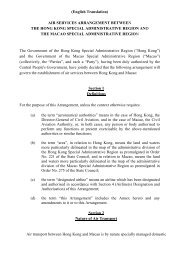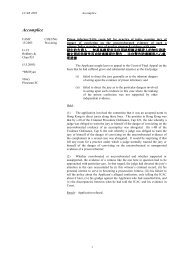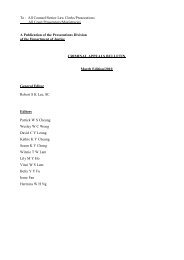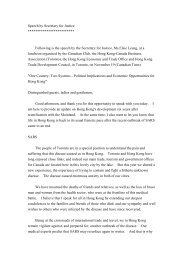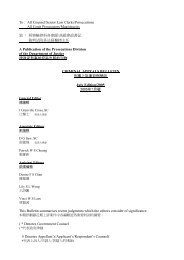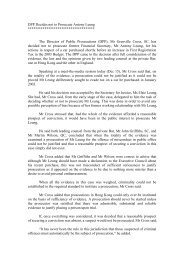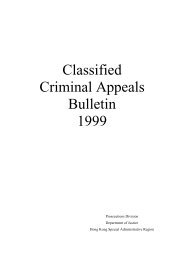刑事檢控科各律師/高級律 - Department of Justice
刑事檢控科各律師/高級律 - Department of Justice
刑事檢控科各律師/高級律 - Department of Justice
You also want an ePaper? Increase the reach of your titles
YUMPU automatically turns print PDFs into web optimized ePapers that Google loves.
41<br />
adduced by the Appellant as to his means. Second, it was said that<br />
in all the circumstances the fine and the default order <strong>of</strong><br />
imprisonment were manifestly excessive and wrong in principle.<br />
Held :<br />
(1) An examination by the magistrate <strong>of</strong> the circumstances<br />
under which the bail money was obtained and whether he was able<br />
to, or wished to, use it to pay a fine was not necessarily the same<br />
as an enquiry as to a defendant’s ability to pay a fine;<br />
(2) No information was given by the defence counsel in<br />
mitigation as to the Appellant’s ability to pay the fine. The<br />
magistrate did not ask any questions as to means, but immediately<br />
seized on the bail money as a possible way <strong>of</strong> paying the fine. The<br />
Appellant said he borrowed the money from his brother and did<br />
not want to use that money for paying the fine;<br />
(3) The magistrate should have made enquiries as to the<br />
financial circumstances <strong>of</strong> the Appellant generally and considered<br />
(a) whether or not a fine <strong>of</strong> $20,000 was appropriate; (b) whether<br />
or not the Appellant was able to pay it, and (c) if so, how long it<br />
would take him to pay it. Although the Appellant was a repeat<br />
<strong>of</strong>fender, there was no evidence before the court to show he had<br />
pr<strong>of</strong>ited in any way, except as an employee from the venture for<br />
which he was arrested;<br />
(4) A magistrate should decide whether a fine was appropriate<br />
in the circumstances <strong>of</strong> the case and, if so, what the amount should<br />
be. That might involve some enquiries <strong>of</strong> a defendant in person,<br />
or submissions from counsel if represented, as to a defendant’s<br />
means and ability to pay a fine. If a defendant agreed, money for<br />
the whole or part <strong>of</strong> a fine could be taken from the bail money;<br />
(5) If a defendant declined to use bail money because, as in this<br />
case, it was borrowed, or was to be used for some other purposes,<br />
enquiries should be made as to whether or not time was needed, or<br />
should be given, for payment. The magistrate’s enquiry focused<br />
solely on whether or not the bail money was the Appellant’s to<br />
dispose <strong>of</strong> as he wished, rather than his ability to meet a fine;<br />
(6) Having decided that the bail money was the Appellant’s to<br />
dispose <strong>of</strong>, it appeared that the magistrate was annoyed by his<br />
continued refusal to use the bail money to pay the fine. This<br />
resulted in the additional, immediate 3 months’ imprisonment in<br />
default <strong>of</strong> payment. That was wrong in principle, because it must<br />
have appeared to the Appellant that he was being punished with 3<br />
months’ imprisonment for refusing to use his bail money to pay<br />
the fine, rather than being fined as a deterrent linked to his



